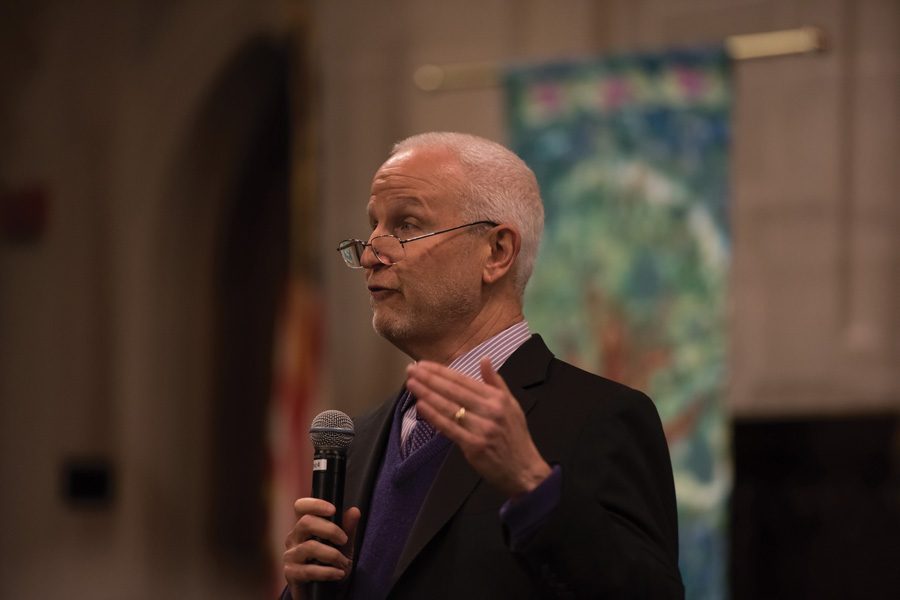Schapiro: Trump’s executive order on immigration presents ‘serious concerns’ for Northwestern
Daile file photo by Katie Pach
University President Morton Schapiro delivers a talk last week at a church in Wilmette. Schapiro made a statement Sunday saying President Trump’s executive order regarding immigrants and refugees raises “serious concerns” for the Northwestern community.
January 29, 2017
University President Morton Schapiro advised Sunday against international travel for students from seven Muslim-majority countries targeted in a recent executive order by President Donald Trump.
Schapiro sent students a statement via email in response to the executive order, which bars citizens of Iran, Iraq, Sudan, Syria, Libya, Yemen and Somalia, from entering the United States for 90 days — a timeline that could be extended with another motion. The order also blocks refugees from entering the U.S. for 120 days and prevents Syrian refugees from entering indefinitely.
The executive order, signed Friday, received widespread backlash, sowing confusion and instigating protests in airports across the country, including Chicago. A federal judge in New York blocked a portion of the order Saturday night, inhibiting the government from deporting some travelers en route when the order was enacted.
Schapiro wrote that the University believes there is “no legitimate basis” to prohibiting visa-holders from the seven predominantly Muslim countries from continuing their academic work in the U.S.
“Knowledge knows no borders, and we all benefit greatly from the presence of the talented international students, faculty and staff who are members of the Northwestern community,” Schapiro said in the statement. “I sincerely hope that the Administration quickly makes clear that this country still welcomes scholars and students from around the world.”
In an interview with The Daily earlier this month and before the executive order, Schapiro said he was not “all that worried” about the U.S. political climate affecting the experience of international students at Northwestern or their application trends, considering the vast majority of international students do not come from the countries that would likely be included in a White House immigration directive.
According to University data, 49 students at NU during the 2016-17 school year are from the seven countries mentioned in Trump’s executive order. Forty-five of the students are from Iran. The majority of international students come from China, South Korea and India.
“One good thing about this country, there’s a lot of protection,” Schapiro said in the interview on Jan. 18. “You know, so it’s not as easy for a president to do executive orders.”
Northwestern’s total international student population has steadily increased since he first came to campus, Schapiro said in the interview, and he doubts the trend will change.
Northwestern is working closely with the Association of American Universities to “monitor the situation,” Schapiro wrote in his statement Sunday. Several other universities, including Stanford University, also recommended against international travel for their students and faculty affected by the executive order.
AAU released a statement Saturday emphasizing that the executive order is “stranding” students already approved to study in the United States and “threatens to disrupt education and teaching of others.” A representative from AAU told The Daily that the organization is in communication with its member campuses as well as the Trump administration.
“We also urge the Administration, as soon as possible, to make clear to the world that the United States continues to welcome the most talented individuals from all countries to study, teach, and carry out research and scholarship at our universities,” the statement said. “It is vital to our economy and the national interest that we continue to attract the best students, scientists, engineers, and scholars.”
In response to the order, the University of Michigan president announced Saturday morning that the school would not reveal the immigration status of its students.
Additionally, as of Sunday afternoon, 79 Northwestern faculty members had signed an online petition opposing the executive order.
Email: matthewchoi2018@u.northwestern.edu
Twitter: @matthewchoi2018



